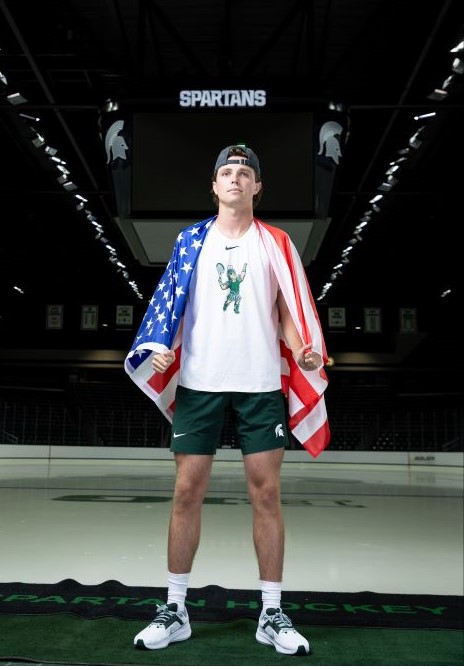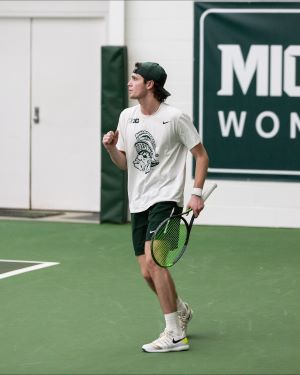Balancing tennis and psychology: Luke Baylis on thriving as a student athlete
September 5, 2025 - Shelly DeJong
 Student athlete Luke Baylis graduated in 2024 with a Bachelor of Science in Psychology and a list of accolades including Academic All-Big, Big Ten Distinguished Scholar, ITA Scholar Athlete, and more. As a MSU student, Luke found a way to thrive on the court and in the classroom. Now in his second year at Michigan State’s College of Osteopathic Medicine, Luke shares about his experience as a psychology major and student athlete, what tips he has for other student athletes, and more!
Student athlete Luke Baylis graduated in 2024 with a Bachelor of Science in Psychology and a list of accolades including Academic All-Big, Big Ten Distinguished Scholar, ITA Scholar Athlete, and more. As a MSU student, Luke found a way to thrive on the court and in the classroom. Now in his second year at Michigan State’s College of Osteopathic Medicine, Luke shares about his experience as a psychology major and student athlete, what tips he has for other student athletes, and more!
Tell us about your experience as a MSU tennis player.
Being part of the team and competing for MSU meant a lot to me. I grew up a Spartan, my mom went here, both my sisters went here, one played tennis here, and the other graduated from MSU’s medical school, so coming here felt natural. My time as a tennis player had its ups and downs, but I wouldn’t trade it for the world. It really shaped who I am today.
When I first started playing tennis at Michigan State my freshman year, I struggled quite a bit with my mental health, and that played a big role in my decision to major in psychology. Playing tennis helped me realize how much goes on in your mind and how valuable it is to understand your own thoughts and have tools to cope, especially if you can’t always see a psychologist. Over time, I learned the importance of being vulnerable, even with my team, and breaking the stigma that opening up is a sign of weakness.
 Did psychology work well with being a student athlete?
Did psychology work well with being a student athlete?
Majoring in psychology as a student athlete worked really well. Psych made it easy to work around my tennis schedule. There were more class options that fit with practice times, so I could stay on top of both school and sports. I’d always liked psychology, especially AP Psych in high school, and it felt like a good fit even with my interest in med school. My parents and I sat down to map out my schedule, and I ended up loving all of my professors. They were super accommodating to the demands of being a student-athlete. The professors made it possible for me to excel in both tennis and my major, which made the whole experience really positive. I never felt like I was falling behind—the course load was manageable while still covering everything I needed to learn. It even gave me a head start for medical school, especially in the psychiatry system, because I already had a solid foundation from my classes.
I knew other athlete-psych majors who had good experiences too. My path was a bit different since I wanted to go to med school, and I wasn’t sure at first how that would work. But with support from my family and my advisor, Sarah Handspike, I was able to take all the psych classes I loved while also fitting in the labs, Biochemistry, and other med school prerequisites. I never felt overwhelmed, and while I may have had fewer upper-level science classes than some of my classmates, I think it gave me a more balanced, less stressful college experience. I even think med schools appreciate seeing a unique path like psych, as long as you stay on top of your coursework and get your prerequisites done.
Did psychology play a role in your tennis game?
I used to see a sports psychologist regularly, and even in high school I saw a psychologist for mental health issues. Once I started, it completely changed how I performed both on the court and in the classroom. That’s a big reason I chose psychology as my major. I knew it worked, I trusted the psychologist I had, and I saw firsthand how beneficial it was. Being around sports psychologists and hearing their mindset really intrigued me and seeing how much it helped me made me want to go that route myself.
I made seeing a psychologist a priority even when things were going well in my game, it helped me stay on track. I knew the moment I stopped, I risked slipping into a spiral again. Keeping that routine not only helped with school but also reduced the pressure I felt on the court.
 Do you have any advice for students wondering if they can balance being a student athlete and academics?
Do you have any advice for students wondering if they can balance being a student athlete and academics?
My biggest advice is for student athletes: don’t limit yourself just because you play a sport. If you want a balance of school and athletics, go after what actually interests you. Professors will work with you and make accommodations for your athletic requirements.
Also, don’t panic if you don’t know what you want to do after your first year. I thought I had it figured out, but I switched paths and still graduated in four years. The key is staying on top of things and choosing something you enjoy. It’ll make your whole college experience way better on and off the court.
Do you have any favorite MSU memories that stand out?
There are so many great memories, but some of the best were going to the football games—especially the Michigan State vs. Michigan game on Halloween when we won. Tailgating outside the stadium with my parents, friends from high school, teammates, and friends was also special.
Being part of the team was tough—early mornings, constant practice—but competing for Michigan State with that Spartan S on my chest made it all worth it. One moment I’ll never forget was after the campus shooting. We were the first home game back, just days after the tragedy, and there was a lot of debate about whether to play. I wasn’t sure if I could play, but I decided to go for it, and we won 4-3, with me winning my match. The community support that day was incredible and showed me how much MSU cares beyond sports. That match helped me move forward, gave me perspective, and reminded me that tennis isn’t everything. It’s something I can lean on when times get tough, but having a support system is what really matters. I’m so glad I played instead of stepping away. It made me more grateful to be alive and doing what I love.
 Do you want to give a shout out to anyone that kind of helped you in your psychology journey?
Do you want to give a shout out to anyone that kind of helped you in your psychology journey?
Sarah Handspike and Danny Sager, my athlete academic advisor, were huge supports. They always helped me stay on track and reassured me that I could do it. I really appreciated how much they believed in me. My whole team was also super supportive, especially when I opened up about my mental health; having them to lean on meant a lot.
My parents have been everything, but my two older sisters were especially key. My oldest sister, who played tennis at MSU, helped me navigate the athletic side. She went through similar struggles and pushed me to stick with it when I wasn’t sure I could. My other sister, a doctor who went through MSU’s med school, helped me with the academic side, guiding me through psych classes and what medical school looks like. Together, my sisters pushed me to be the best I could be. They believed in my potential even more than I did, and I’m really grateful for their support in helping me get where I am.
Anything else you’d like to add?
For any athletes or students coming into MSU or psych, I’d say I had a really positive experience overall. The biggest thing is to be grateful you’re there and make sure you enjoy it because college goes by way faster than you think. As long as you stay on top of your schoolwork and find that balance, things will work out.
You might feel overwhelmed at first, but by the time you graduate, you’ll be amazed at how much you’ve grown and changed. I couldn’t believe the person I was at the end compared to when I started. So, don’t overthink it. Stay grateful, enjoy the ride, and do it all with a smile.

